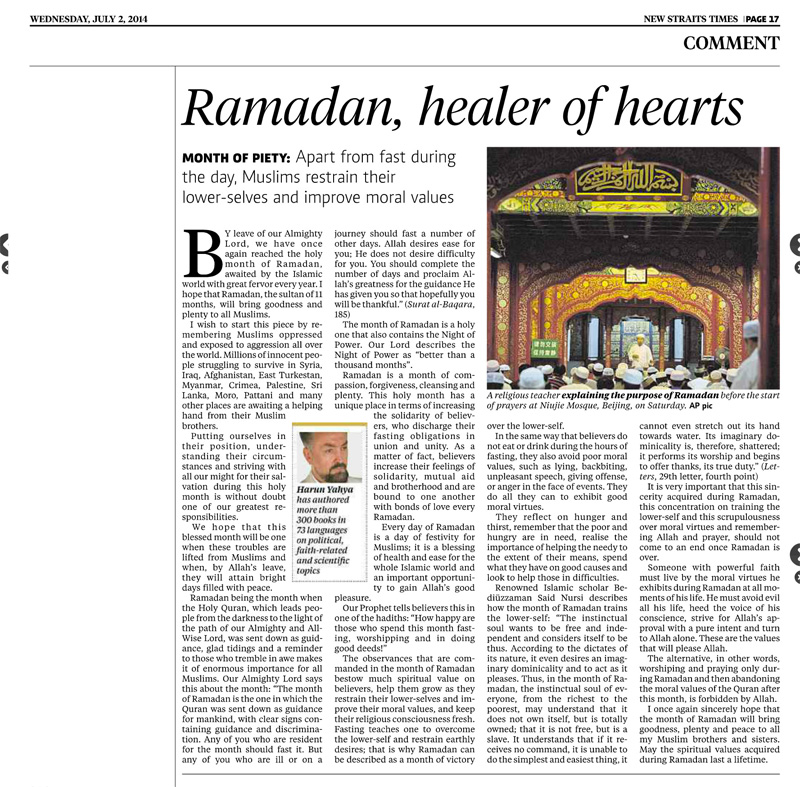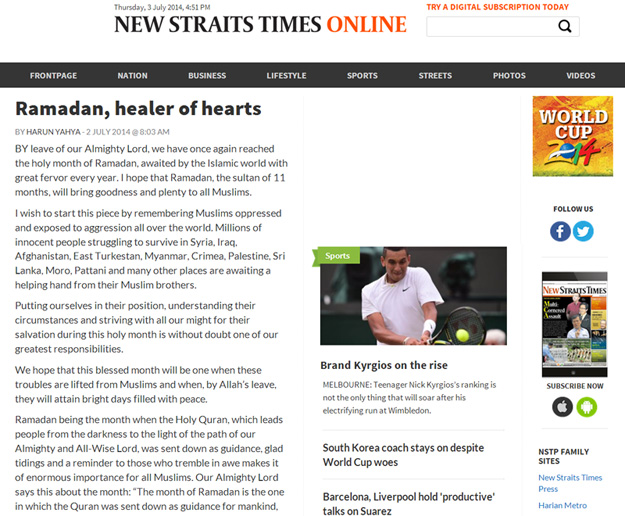

BY leave of our Almighty Lord, we have once again reached the holy month of Ramadan, awaited by the Islamic world with great fervor every year. I hope that Ramadan, the sultan of 11 months, will bring goodness and plenty to all Muslims.
I wish to start this piece by remembering Muslims oppressed and exposed to aggression all over the world. Millions of innocent people struggling to survive in Syria, Iraq, Afghanistan, East Turkestan, Myanmar, Crimea, Palestine, Sri Lanka, Moro, Pattani and many other places are awaiting a helping hand from their Muslim brothers.
Putting ourselves in their position, understanding their circumstances and striving with all our might for their salvation during this holy month is without doubt one of our greatest responsibilities.
We hope that this blessed month will be one when these troubles are lifted from Muslims and when, by Allah’s leave, they will attain bright days filled with peace.
Ramadan being the month when the Holy Quran, which leads people from the darkness to the light of the path of our Almighty and All-Wise Lord, was sent down as guidance, glad tidings and a reminder to those who tremble in awe makes it of enormous importance for all Muslims. Our Almighty Lord says this about the month: “The month of Ramadan is the one in which the Quran was sent down as guidance for mankind, with clear signs containing guidance and discrimination. Any of you who are resident for the month should fast it. But any of you who are ill or on a journey should fast a number of other days. Allah desires ease for you; He does not desire difficulty for you. You should complete the number of days and proclaim Allah’s greatness for the guidance He has given you so that hopefully you will be thankful.” (Surat al-Baqara, 185)
The month of Ramadan is a holy one that also contains the Night of Power. Our Lord describes the Night of Power as “better than a thousand months”.
Ramadan is a month of compassion, forgiveness, cleansing and plenty. This holy month has a unique place in terms of increasing the solidarity of believers, who discharge their fasting obligations in union and unity. As a matter of fact, believers increase their feelings of solidarity, mutual aid and brotherhood and are bound to one another with bonds of love every Ramadan.
Every day of Ramadan is a day of festivity for Muslims; it is a blessing of health and ease for the whole Islamic world and an important opportunity to gain Allah’s good pleasure.
Our Prophet tells believers this in one of the hadiths: “How happy are those who spend this month fasting, worshipping and in doing good deeds!”
The observances that are commanded in the month of Ramadan bestow much spiritual value on believers, help them grow as they restrain their lower-selves and improve their moral values, and keep their religious consciousness fresh. Fasting teaches one to overcome the lower-self and restrain earthly desires; that is why Ramadan can be described as a month of victory over the lower-self.
In the same way that believers do not eat or drink during the hours of fasting, they also avoid poor moral values, such as lying, backbiting, unpleasant speech, giving offense, or anger in the face of events. They do all they can to exhibit good moral virtues.
They reflect on hunger and thirst, remember that the poor and hungry are in need, realise the importance of helping the needy to the extent of their means, spend what they have on good causes and look to help those in difficulties.
Renowned Islamic scholar Bediüzzaman Said Nursi describes how the month of Ramadan trains the lower-self: “The instinctual soul wants to be free and independent and considers itself to be thus. According to the dictates of its nature, it even desires an imaginary dominicality and to act as it pleases. Thus, in the month of Ramadan, the instinctual soul of everyone, from the richest to the poorest, may understand that it does not own itself, but is totally owned; that it is not free, but is a slave. It understands that if it receives no command, it is unable to do the simplest and easiest thing, it cannot even stretch out its hand towards water. Its imaginary dominicality is, therefore, shattered; it performs its worship and begins to offer thanks, its true duty.” (Letters, 29th letter, fourth point)
It is very important that this sincerity acquired during Ramadan, this concentration on training the lower-self and this scrupulousness over moral virtues and remembering Allah and prayer, should not come to an end once Ramadan is over.
Someone with powerful faith must live by the moral virtues he exhibits during Ramadan at all moments of his life. He must avoid evil all his life, heed the voice of his conscience, strive for Allah’s approval with a pure intent and turn to Allah alone. These are the values that will please Allah.
The alternative, in other words, worshiping and praying only during Ramadan and then abandoning the moral values of the Quran after this month, is forbidden by Allah.
I once again sincerely hope that the month of Ramadan will bring goodness, plenty and peace to all my Muslim brothers and sisters. May the spiritual values acquired during Ramadan last a lifetime.
Adnan Oktar's piece on New Straits Times:


